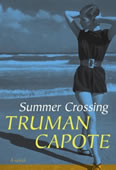Summer Crossing

Ed. Random House
Date de publication : 01/10/2005
'Truman Capote is the most perfect writer of my generation.' Norman Mailer
ln 1966, Truman Capote, flush with wealth from the recent publication of In Cold Blood, abandoned his humble Brooklyn apartment along with its contents- which included a box of documents that his house sitter thoughtfully rescued from the curb. In late 2004 this trove of Capote papers went up for auction at Sotheby's. Included in the lot were four school notebooks containing the handwritten manuscript of Summer Crossing, a novel Capote began writing in 1943, only to set it aside when he turned his attentions to what would be his stunning literary debut, Other Voices, Other Rooms. (Capote, however, would continue to tinker with Summer Crossing on and off for a decade before finally setting it aside for good.) Since the time of his death in 1984, Capote scholars and biographers had long believed the manuscript lost, never to be recovered.
To what should be almost no one's surprise, Truman Capote's account of love and wayward youth more than lives up to the amazing tale behind this book's forsaken manuscript. Set in New York just after World War Il, Summer Crossing is the story of a young carefree socialite, Grady McNeil, whose parents leave her alone in their Fifth Avenue penthouse for the summer. Left to her own devices, Grady turns up the heat on the secret affair she's been having with a Brooklyn-born jewish war veteran who works as a parking lot attendant. As the season passes, the romance turns more serious and morally ambiguous, and Grady must eventually make a series of decisions that will forever affect her life and the lives of everyone around her.
Summer Crossing is a precocious, confident first novel
that displays the nearly perfect prose and flawless narrative sense of one of the twentieth century's greatest writers. Its immaculate turns of phrase, hard irony, and insight into the subtleties of class distinction will point to Capote's future triumphs, especially Breakfast at Tiffany's, and its dashing and complex heroine will remind readers of that novella's enchanting Holly Golightly. Worthy of a spot on any reader's Capote bookshelf, this is, in every sense, a lost treasure found.
Présentation de l'éditeur
